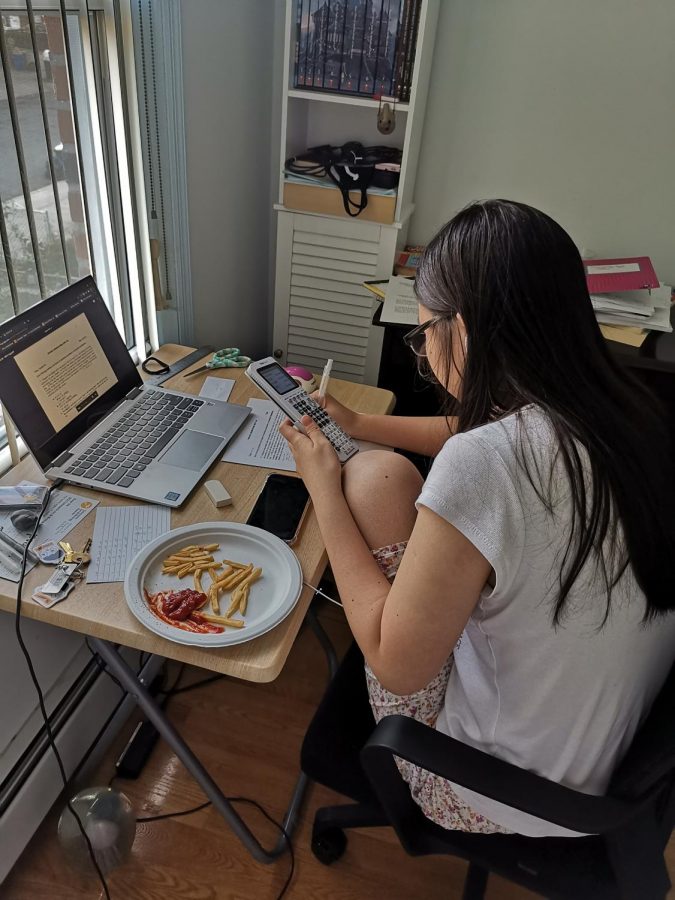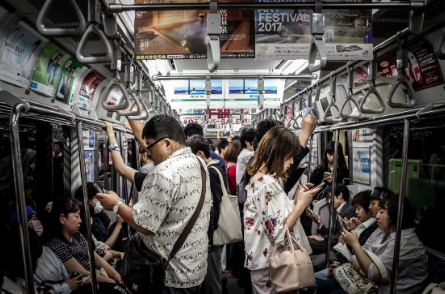The Dangers of Stubborn Fat
Exercise: Now Better Than Ever!
Kelly Hu ’22, a student at Stuyvesant High School, routinely sits at her desk for up to twelve hours a day. She often brings and eat her daily meals at her desk, while she is working and attending remote Zoom classes.
With the boredom and stress that has accompanied quarantine during the COVID-19 pandemic, many have turned to food in their fridge and their kitchen cabinets for comfort. Eating our problems away has become a solution for many students and adults alike, and along with the surge of stress-eating, weight gain has begun to rise.
Due to the Coronavirus pandemic, thousands of schools around the world, including Bronx Science, have either shut down entirely or gone to a blended learning model, with a mixture of in-person classes and remote learning, in order to prevent the Coronavirus’s spread. Since many students around the world have chosen the fully remote model and are consequently attending their virtual classes in front of their laptops on a daily basis, physical activity and fitness for students around the world are at an all-time low.
A study written by Yabesh et al. (2013) found that children’s body mass index falls by 1.5 percentile points during the school year. Having a schedule provided students with the structured nature of a school day, with periods for when to exercise and limited chances in which to snack. There were gyms and a weight room for physical activities. Even just walking up and down the stairs allowed students to get some exercise within their day-to-day life.
However, when students are at home, their body mass index shoots up about five percentile points. This sudden increase is due to them having no time constraints for when or where to eat, nor a gym to facilitate proper workouts. The safest location to exercise at is home. Yet, a cramped New York City apartment may not have enough space to move around or any equipment for weight training exercises. Sadly, exercise equipment needs to be bought, and space needs to be rented. All of this costs money, but during the Coronavirus pandemic, money is hard to come by. As such, staying at home discourages many students from exercising.
Even students who exercised before the pandemic have lost the time to stay physically active due to the long hours required with virtual learning and Zoom and Google Meet classes. “Before quarantine, I was working out six times a week for about one and a half to two hours a day, but as soon as the quarantining started, I started just not working out at all, and that’s been the case ever since,” said Harrison Krieger ’21.
In addition to inactivity while staying at home, students’ general stress has made them gain weight. Dr. Artur Viana, clinical director of the Yale Metabolic Health & Weight Loss Program, said, “We know that obesity’s causes are multifactorial and that stress is involved. Not only are there organic body changes, but we turn to food as a way to cope with stress.” Pantries at home are stocked with shelf-stable foods, such as sugary snacks and potato chips. The constant stress of the Coronavirus pandemic along the troubles of the world cause people to rummage through the food stock and seek comfort food. The lack of a daily routine allows people to indulge in snacks, eat more, and pack on more pounds. Feeding the hollow in our stomachs is the only way to keep ourselves sane.
Furthermore, when stressed, the body switches to fight-or-flight mode. Dr. Morton, medical director of bariatric surgery at Yale-New Haven Health System, said, “When you’re stressed, your body will sense it, and it will not give up any calories when it thinks it needs energy for running away or combat.” As a result, the body’s metabolism lowers, and it will not lose weight as quickly.
Despite the temptations of snacking, gaining weight, especially during the Coronavirus pandemic, is risky and ill-advised. There are several serious health problems associated with weight gain, including diabetes, cancer, and heart disease. As COVID-19 cases continue to rise across the country, there are limited available beds in hospitals and a limited number of doctors to treat illnesses. In a study conducted by Nakeshandi et al. (2020), overweight and obese patients who required mechanical assistance for breathing had an increased likelihood of passing away. Becoming sick in such troubling times is scary, and exercising and eating healthy is the best way to avoid it.
According to the Centers for Disease Control and Prevention (CDC), severe obesity increases the risk of acute respiratory distress syndrome, a dangerous and often fatal breathing illness. In turn, this illness, along with other chronic diseases and health complications associated with obesity, increases the severity of the Coronavirus’ effects and the risk of mortality.
Obesity may also reduce the effectiveness of a COVID-19 vaccine, as seen in cases with traditional flu vaccines given annually. The cause may be due to their altered immune response and the inflammatory changes that occur.
Weight gain is hard to avoid when we are stuck at home with the temptation of food surrounding us. However, it is dangerous as it brings with it a plethora of deadly health issues, which become amplified if one contracted the Coronavirus.
Although maintaining a healthy weight is challenging, it is not impossible. It requires a mindful diet and a set time for when to exercise. Most importantly, have a method of releasing stress. Your mental health is essential.
To read an informative article entitled, ‘Weight Gain During COVID-19: The Resulting Sleep Pandemic,’ click HERE.
Although maintaining a healthy weight is challenging, it is not impossible. It requires a mindful diet and a set time for when to exercise. Most importantly, have a method of releasing stress. Your mental health is essential.
Nicole Hu is a Staff Reporter for 'The Science Survey.' She enjoys reading articles about new discoveries and the unknown. They are informative and allow...











